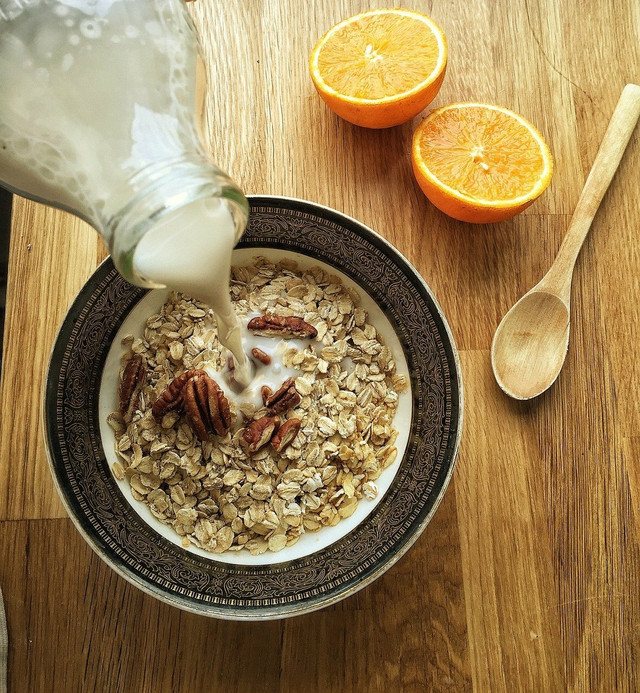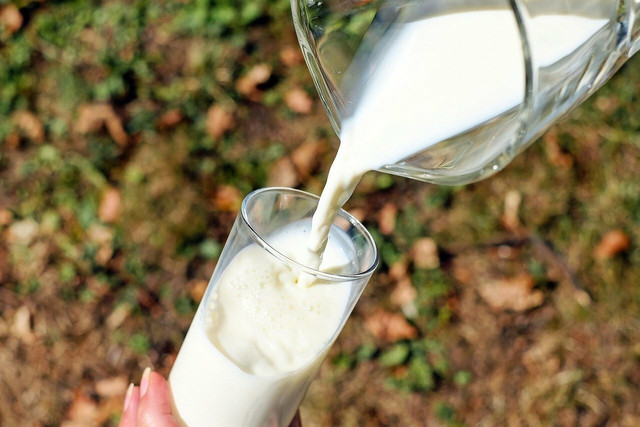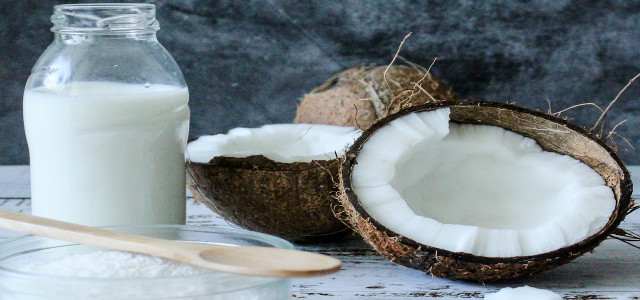When it comes to coconut milk vs. almond milk, how do you know which one’s healthier? And better for the planet? Our discussion tackles this question once and for all.
Coconut Milk vs. Almond Milk: How They’re Made
Two of the most popular lactose-free vegan alternatives to cow’s milk include almond and coconut milk.
- Almond milk, which is made from finely powdered almonds and water, has a sweet, nutty taste and a slight graininess to its texture.
- Coconut milk, on the other hand, is much richer and creamy as it has a lot more fat and calories than almond milk since it’s created from soaking powdered coconut flesh in water.
To make almond milk:
- A large number of toasted almonds is roasted and then crushed into a fine powder.
- After that, purified water is added.
If you want to make almond milk yourself, we recommend soaking the almonds overnight, before crushing them. This way, they will be processed more easily. You’ll find more tips here: How Do You Make Almond Milk? Easy Homemade Recipe
Note: Almond milk from the supermarket contains vitamins that are naturally occurring as well as vitamins that are added during the mixing process.
Coconut milk can only be made from brown coconuts, which have white flesh or meat inside their shell.
- The meat is shredded and boiled in water after being grated.
- The final result is made by straining the flesh. As this method often yields thicker milk, it is necessary to filter the mixture twice in order to reduce the thickness.
The good news is that the usual formula for both kinds of milk does not include any artificial ingredients, colorings, flavorings, or GMOs. When buying either milk, it’s still better to give the ingredients list a close look.
Note: Industrially produced coconut milk, too, isn’t simply coconut water in a carton all the time. Depending on the brand, gums, vitamins, and minerals are all possible additives, as well as controversial thickeners like carrageenan.
Coconut Milk vs. Almond Milk: Nutritional Facts

(Foto: CC0 / Pixabay / CookYourLife)
Although the distinctions between coconut milk vs. almond milk may seem blatant, there is more to it than meets the eye. The nutritional composition of coconut milk and almond milk differs greatly. Listed below are the nutritional values that can be found in one cup of each.
Coconut Milk
- Calories – 76
- Fat –5g
- Saturated fats – 5g
- Protein – 0.5g
- Carbohydrates – 7g
Almond Milk
- Calories – 37
- Fat –2g
- Saturated fats – Protein – 0.2g
- Protein – 1g
- Carbohydrates – 3g
Health Benefits of Coconut Milk vs. Almond Milk
When it comes to the coconut milk vs. almond milk dilemma, rest assured that both are healthy dairy substitutes, full of nutrients and health benefits.
Although coconut oil has been linked to antioxidant properties, the jury is still out about the health benefits of coconut milk, as there is still much more verified research to be done. Nevertheless, coconut milk can serve as a substitute for folks who are lactose intolerant or allergic to dairy.
Almond milk, on the other hand, is devoid of cholesterol and high in heart-healthy lipids. Vitamin E, an antioxidant found in abundance in almond milk, protects the body from free radical damage. Fortified almond milk also has 50 percent more calcium than dairy milk, and it is known to help with the decrease of body weight.
This is because almond milk has a low saturated fat content. It’s also quite low in terms of carbs, fat, and carbohydrates, which might help you lose or maintain your weight. When we compare it with coconut milk, the health benefits seem more apparent.
Impact on Health and the Environment



(Foto: CC0 / Pixabay / Alexas_Fotos)
The beautiful thing about these plant-based milk alternatives is that they help you cut down on your intake of animal products, which is something many people are attempting to accomplish. Making a glass of dairy milk generates nearly three times as much greenhouse gas emissions and uses nine times as much land as any other plant-based milk substitute.
Almond milk has had a bit of a tarnished reputation recently in terms of environmental impact. The production of a glass of almond milk uses around 74 liters of water, making it the most water-intensive of all plant-based alternatives to milk.
Almonds are an exceedingly popular specialty crop in the USA, and colossal orchards span formable plots of land in California’s parched Central Valley. To meet the ever-increasing demand for greater almond yields, commercial beekeepers in the United States are under excessive strain. Every spring, Californian almond pollination necessitates a nationwide movement of billions of honeybees migrating thousands of kilometers to produce the almonds. As a result, of being transported across long distances, bee colonies are often harmed in the process. (Read more: Is Almond Milk Vegan?)
In terms of water, coconut farming is a low-impact activity, but there are worries that as demand for coconut goods grows, rainforests in tropical Asia could be devastated. The fruit is mostly grown in monocultures, coconut transportation also contributes to pollution because of the long distances they must travel it takes to get them from one part of the world to another.
Is One Superior to the Other?
When it comes to coconut milk vs. almond milk, each has its unique charm since they can be taken either fresh or cooked and baked. Basic, vanilla, and chocolate tastes of almond milk are the most common selections. Although, these will contain more added sugars. Because of its distinct coconut flavor, coconut milk is often used in savory meals like curries and sweet desserts like coconut macaroons, but not in beverages like coffee or tea.
Although coconuts have a wonderful reputation for being exotic and nourishing, collecting them for less than $1 a day is far from bliss for the underprivileged of the Philippines, Indonesia, and India. As coconut palms can only be farmed in tropical places, the desire to meet global demand is leading to worker mistreatment and the destruction of rainforests. We recommend that you only buy Fair Trade certified coconut products to avoid supporting unethical business practices.
Which Plant-Based Milk Substitutes Are the Best?



(Foto: CC0 / Pixabay / Couleur)
For a lot of folks, the answer to the coconut milk vs. almond milk question may still depend largely on personal taste, there are factors worth considering before rushing out to the store.
Simply put, plant-based milk is much healthier for the environment than dairy milk. Purchasing organic plant-based milk, in particular, is the finest option.
On the other side of the coin, however, plant-based milks, too, have an unfortunate cost, just like any other crop produced in large amounts. It’s crucial to think about more than whether they’re cultivated organically. Other considerations include the impact of crop cultivation on people and native ecosystems in underdeveloped nations, as well as the CO2 emissions and water consumption.
In our opinion, it’s best to branch out a little rather than becoming fixated on a single kind of plant-based milk. As we’ve seen in the past, once demand soars, there is a danger of additional environmental issues connected with industrial-scale expansion. You should, however, give regionally produced oat milk a try: It’s low in emissions, land and water use, and tastes just as good as any other plant-based milk alternative.
Read more:
- Can You Freeze Coconut Milk? What to Keep in Mind
- How Do You Make Almond Milk? Easy Homemade Recipe
- Golden Milk: Health Benefits and Recipe for Turmeric Latte
Do you like this post?









